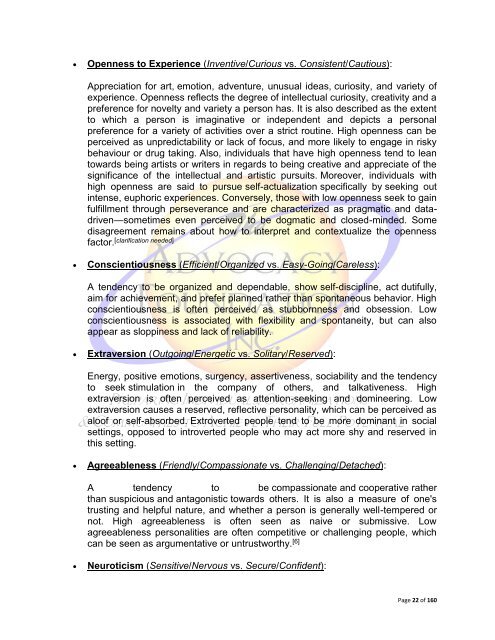The Gift of Introversion
The Gift of Introversion
The Gift of Introversion
Create successful ePaper yourself
Turn your PDF publications into a flip-book with our unique Google optimized e-Paper software.
Openness to Experience (Inventive/Curious vs. Consistent/Cautious):<br />
Appreciation for art, emotion, adventure, unusual ideas, curiosity, and variety <strong>of</strong><br />
experience. Openness reflects the degree <strong>of</strong> intellectual curiosity, creativity and a<br />
preference for novelty and variety a person has. It is also described as the extent<br />
to which a person is imaginative or independent and depicts a personal<br />
preference for a variety <strong>of</strong> activities over a strict routine. High openness can be<br />
perceived as unpredictability or lack <strong>of</strong> focus, and more likely to engage in risky<br />
behaviour or drug taking. Also, individuals that have high openness tend to lean<br />
towards being artists or writers in regards to being creative and appreciate <strong>of</strong> the<br />
significance <strong>of</strong> the intellectual and artistic pursuits. Moreover, individuals with<br />
high openness are said to pursue self-actualization specifically by seeking out<br />
intense, euphoric experiences. Conversely, those with low openness seek to gain<br />
fulfillment through perseverance and are characterized as pragmatic and datadriven—sometimes<br />
even perceived to be dogmatic and closed-minded. Some<br />
disagreement remains about how to interpret and contextualize the openness<br />
factor.<br />
[clarification needed]<br />
<br />
Conscientiousness (Efficient/Organized vs. Easy-Going/Careless):<br />
A tendency to be organized and dependable, show self-discipline, act dutifully,<br />
aim for achievement, and prefer planned rather than spontaneous behavior. High<br />
conscientiousness is <strong>of</strong>ten perceived as stubbornness and obsession. Low<br />
conscientiousness is associated with flexibility and spontaneity, but can also<br />
appear as sloppiness and lack <strong>of</strong> reliability.<br />
<br />
Extraversion (Outgoing/Energetic vs. Solitary/Reserved):<br />
Energy, positive emotions, surgency, assertiveness, sociability and the tendency<br />
to seek stimulation in the company <strong>of</strong> others, and talkativeness. High<br />
extraversion is <strong>of</strong>ten perceived as attention-seeking and domineering. Low<br />
extraversion causes a reserved, reflective personality, which can be perceived as<br />
alo<strong>of</strong> or self-absorbed. Extroverted people tend to be more dominant in social<br />
settings, opposed to introverted people who may act more shy and reserved in<br />
this setting.<br />
<br />
Agreeableness (Friendly/Compassionate vs. Challenging/Detached):<br />
A tendency to be compassionate and cooperative rather<br />
than suspicious and antagonistic towards others. It is also a measure <strong>of</strong> one's<br />
trusting and helpful nature, and whether a person is generally well-tempered or<br />
not. High agreeableness is <strong>of</strong>ten seen as naive or submissive. Low<br />
agreeableness personalities are <strong>of</strong>ten competitive or challenging people, which<br />
can be seen as argumentative or untrustworthy. [6]<br />
<br />
Neuroticism (Sensitive/Nervous vs. Secure/Confident):<br />
Page 22 <strong>of</strong> 160

















